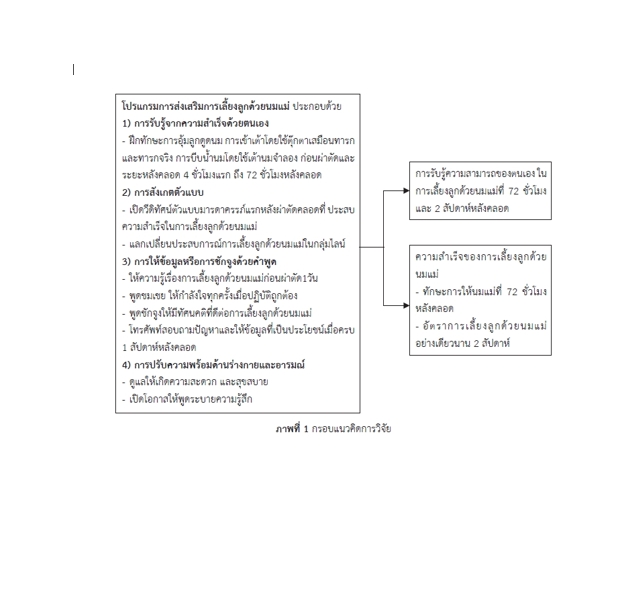ผลของโปรแกรมการส่งเสริมการเลี้ยงลูกด้วยนมแม่ต่อการรับรู้ความสามารถของตนเองในการเลี้ยงลูกด้วยนมแม่และความสำเร็จของการเลี้ยงลูกด้วยนมแม่ของมารดาครรภ์แรกที่ผ่าตัดคลอดแบบวางแผนล่วงหน้า
คำสำคัญ:
การรับรู้ความสามารถของตนเองในการเลี้ยงลูกด้วยนมแม่, โปรแกรมการส่งเสริมการเลี้ยงลูกด้วยนมแม่, ความสำเร็จของการเลี้ยงลูกด้วยนมแม่บทคัดย่อ
การวิจัยกึ่งทดลองครั้งนี้ มีวัตถุประสงค์เพื่อศึกษาผลของโปรแกรมการส่งเสริมการเลี้ยงลูกด้วยนมแม่ต่อการรับรู้ความสามารถของตนเองในการเลี้ยงลูกด้วยนมแม่และความสำเร็จของการเลี้ยงลูกด้วยนมแม่ของมารดาครรภ์แรกที่ผ่าตัดคลอดแบบวางแผนล่วงหน้า กลุ่มตัวอย่างเป็นมารดาครรภ์แรกที่ผ่าตัดคลอดแบบวางแผนล่วงหน้าและพักฟื้นที่หอผู้ป่วยหลังคลอดของโรงพยาบาลพระปกเกล้า จังหวัดจันทบุรี จำนวน 52 ราย เลือกแบบเฉพาะเจาะจง แบ่งเป็นกลุ่มควบคุม 26 ราย และกลุ่มทดลอง 26 ราย เครื่องมือการวิจัย ประกอบด้วย โปรแกรมการส่งเสริมการเลี้ยงบุตรด้วยนมแม่ แบบวัดการรับรู้ความสามารถของตนเองในการเลี้ยงลูกด้วยนมแม่ แบบประเมินทักษะการให้นมแม่ และแบบบันทึกการเลี้ยงลูกด้วยนมแม่อย่างเดียว 2 สัปดาห์ วิเคราะห์ข้อมูลด้วยสถิติเชิงพรรณา Mann-Whitney U test และ Chi-square test
ผลวิจัยพบว่า กลุ่มทดลอง มีคะแนนทักษะในการให้นมแม่ที่ 72 ชั่วโมงหลังคลอด และคะแนนการรับรู้ความสามารถของตนเองในการเลี้ยงลูกด้วยนมแม่ที่ 2 สัปดาห์หลังคลอดสูงกว่ากลุ่มควบคุมอย่างมีนัยสำคัญทางสถิติ (p <.001) กลุ่มทดลองและกลุ่มควบคุมมีการรับรู้ความสามารถของตนเองในการเลี้ยงลูกด้วยนมแม่ที่ 72 ชั่วโมงหลังคลอด และอัตราของการเลี้ยงลูกด้วยนมแม่อย่างเดียวนาน 2 สัปดาห์ ไม่แตกต่างกันอย่างมีนัยสำคัญทางสถิติ (p =.087, p =.465) ดังนั้น พยาบาลและผดุงครรภ์ควรส่งเสริมการรับรู้ความสามารถของตนเองในการเลี้ยงลูกด้วยนมแม่แก่มารดาหลังคลอดอย่างต่อเนื่อง เพื่อให้มีความเชื่อมั่น และประสบความสำเร็จในการเลี้ยงลูกด้วยนมแม่
เอกสารอ้างอิง
Kontrakan, S., & Wongwisut, T. (2011). Basic knowledge for successful breastfeeding. in Breastfeeding training center Faculty of medicine Siriraj hospital Mahidol university, Workshop on breastfeeding. (p. 7-26). Bangkok: Mahidol University. [in Thai]
Chansiri, S., Wongwatkit, C., & Noonkanka, A. (2021). The effects of self-efficacy promoting program on knowledge, perceived self-efficacy, efficiency of breastfeeding, and exclusive breastfeeding rate in first-time adolescent mothers. Nursing Science Journal of Thailand, 40(1), 50–68. Retrieved from https://he02.tci-thaijo.org/index.php/ns/article/view/248666
Chusin, K. (2012). Breastfeeding and infant health. In Mudtamra, S. (Ed.), Breastfeeding textbook. Bangkok: Iyara Publishing Company. [in Thai]
De Jager, E., Broadbent, J., Fuller-Tyszkiewicz, M., & Skouteris, H. (2014). The role of psychosocial factors in exclusive breastfeeding to six months postpartum. Midwifery, 30(6), 657–666. https://doi.org/10.1016/j.midw.2013.07.008
Dennis, C.L. (1999). Theoretical underpinnings of breastfeeding confidence: A self-efficacy framework. Journal of Human Lactation, 15, 195-201.
Dennis, C.L. (2003). The breastfeeding self-efficacy scale: Psychometric assessment of the short form. Journal of Obstetric, Gynecologic & Neonatal Nursing,3 2(6),734–744.
Hauck, Y. L., Fenwick, J., Dhaliwal, S. S., Butt, J., & Schmied, V. (2011). The association between women's perceptions of professional support and problems experienced on breastfeeding cessation: A Western Australian study. Journal of Human Lactation, 27(1), 49–57. https://doi.org/10.1177/089033441038695
Hobbs, A. J., Mannion, C. A., McDonald, S. W., Brockway, M., & Tough, S. C. (2016). The impact of caesarean section on breastfeeding initiation, duration and difficulties in the first four months postpartum. BMC Pregnancy and Childbirth,16, 90. https://doi.org/10.1186/s12884-016-0876-1
Intarasukum, P. (2014). Onset of lactation after an uncomplicated cesarean delivery: A study between emergency cesarean delivery and elective cesarean delivery. Journal of Health Science, 23(6), 1058-1066. [in Thai]
Lakornket, N., & Jirapeat, V. (2017). The effects of promoting breast feeding self-efficacy program on sufficient of breast milk supply and maintenance of lactation behavior in mothers of newborn after explore laparotomy. Journal of The Royal Thai Army Nurses, 18, 211-220. [in Thai]
National Statistical Office of Thailand. (2020). Thailand multiple indicator cluster survey 2019, survey findings report. Bangkok, Thailand: National Statistical Office of Thailand. Retrieved from https://www.unicef.org/thailand/Thailand_MICS_Full_Report_EN.pdf. [in Thai]
Ngamgarn, W., Leesiriwattanagul, W., Perksanusak, T., & Nuampa, S. (2021). Effect of a nursing program for continuous breastfeeding promotion with family support and early skin to skin contact on effective suckling breastfeed, neonatal jaundice, and exclusive breastfeeding at one month. Journal Prapokklao Hospital Clinical Medical Education Center, 38(1),67-76. [in Thai]
Otsuka, K., Takayanagi,T., Ueda, C., Kudo, K. , Fujii, T., Ito, Y., Ohki, Y., & Ohgi, N. (2022). Breastfeeding self-efficacy at 72 hours postpartum is associated with longer breastfeeding duration : A longitudinal cohort study. International Breastfeeding Journal, 17(1), 1-7.
Sawatpanich, A., Yimyam, S., & Chaloumsuk , N. (2019). Factors influencing exclusive breastfeeding at discharge among first-time mothers undergoing cesarean section. Nursing Journal, 46(3), 219-231.
Semenic, S., Loiselle, C., & Gottlieb, L. (2008). Predictors of the duration of exclusive breastfeeding among first-time mothers. Research in nursing & Health, 31(5), 428-441.
Tharana, N., & Tanasirijiranont, R. (2019). Effects of enhancing self-Efficacy programs on perceived self-efficacy, knowledge and satisfaction in breastfeeding practice among first-time postpartum mothers. Nursing Journal,46(4), 70-82.
Thussanasupap, B. (2006).The effects of systematic instructional program on breastfeeding self-efficacy, nipple pain, nipple skin changes and incision pain of cesarean mothers. Master’s thesis, Nursing, Mahidol University. [in Thai]

ดาวน์โหลด
เผยแพร่แล้ว
รูปแบบการอ้างอิง
ฉบับ
ประเภทบทความ
สัญญาอนุญาต

อนุญาตภายใต้เงื่อนไข Creative Commons Attribution-NonCommercial-NoDerivatives 4.0 International License.




